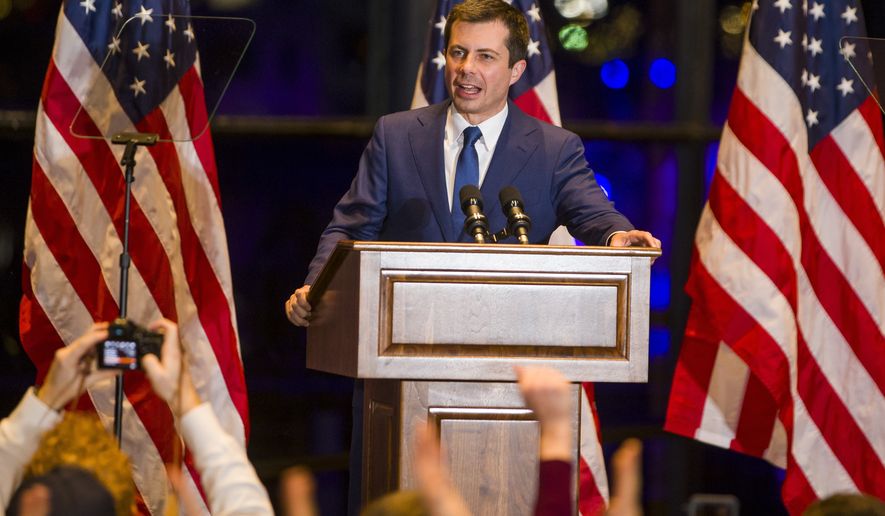Pete Buttigieg on Sunday ended his run for the Democratic presidential nomination, bringing an abrupt end to a campaign that took the openly gay former mayor to the top tier of the race.
He made the decision after a disappointing fourth-place finish in the South Carolina primary Saturday.
He announced his exit to a crowd of supporters in South Bend, Indiana, where his two terms as mayor provided an unlikely launchpad for his White House bid.
Reflecting on his unexpected success against a field crowded with senators, governors and a former vice president, Mr. Buttigieg said that he is proof that America is changing.
“It proved that Americans really are hungry for a new kind of politics rooted in the values that we share in cities and suburbs and rural communities, in crowds that spilled out of venues from Salt Lake City to Raleigh to Arlington,” he said. “We saw Americans ready to meet a new era of challenge with a new generation of leadership.”
He said it also delivered a message of hope to LGBTQ children and others who feel different and marginalized.
“We sent a message to every kid out there wondering if whatever marks them out as different means they are somehow destined to be ’less than’ — to see that someone who once felt that exact same way can because a leading presidential candidate with his husband at his side,” Mr. Buttigieg said.
The decision to quit reflected a realization by Mr. Buttigieg that he would not be a factor in the remaining contests, despite finishing in the money in the first three contests.
His poor showing in South Carolina, where he received roughly 8% of the vote, underscored shortcomings of his campaign as he failed to muster crucial support from black voters.
He placed behind former Vice President Joseph R. Biden with a commanding 48.4% of the vote, Sen. Bernard Sanders with 19.9% and billionaire liberal activist Tom Steyer in a distant third with 11.3%.
Mr. Steyer ended his run shortly after the results were announced Saturday night.
Mr. Buttigieg, 38, was the youngest top-tier contender in the race. His departure leaves a decidedly older competition at the front of the pack, led by Mr. Sanders at 78 and Mr. Biden at 77.
The Buttigieg campaign acknowledged earlier Sunday that he likely would not be a major factor in the Super Tuesday primaries this week when about one-third of all the nominating delegates are up for grabs.
His exit leaves two formidable figures — Mr. Biden and 78-year-old billionaire media mogul Michael Bloomberg — vying to become the alternative to Mr. Sanders, an avowed democratic socialist and front-runner in the delegate hunt.
The departure of Mr. Buttigieg from the race, however, is not expected to dramatically alter the state of the race, according to polling data from Morning Consult.
The data show that Buttigieg supporters’ second choice in polls divided nearly evenly across the field, with about 20% favoring each of Mr. Sanders, Mr. Biden, Mr. Bloomberg and Sen. Elizabeth Warren of Massachusetts.
Still, Mr. Buttigieg made history as the first openly gay candidate to reach the top tier in a presidential race.
He won the Iowa caucuses, defeating Mr. Sanders by a whisker but winning nonetheless. In the New Hampshire primary, he came in a close second to Mr. Sanders.
He finished third with 14.3% of the vote in the Nevada caucuses behind Mr. Biden and Mr. Sanders, as his campaign began to fade.
“This has to be an excruciating decision for him and his team, but it’s a wise one that shows a desire for party unity and a realism about what’s to come,” tweeted Ian Sams, a Democratic campaign operative who served on the Sen. Kamala D. Harris campaign team before she dropped out in December. “Cannot emphasize enough just how incredible his Iowa win — and NH finish — were. Pete broke down real barriers in this race.”
• S.A. Miller can be reached at smiller@washingtontimes.com.




Please read our comment policy before commenting.